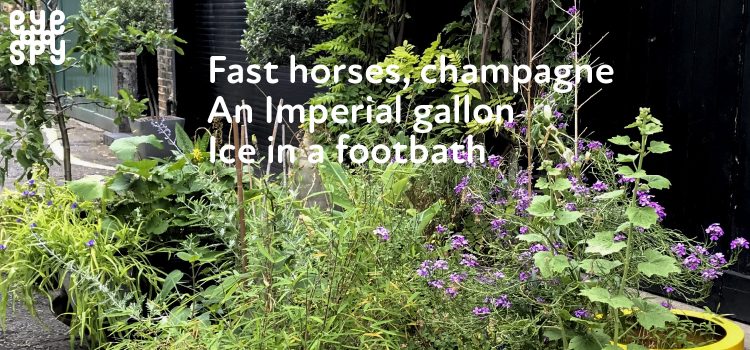
In June, Doughty Mews is in full bloom. A fig tree entwines its way up and around the house on the corner. Doors and windows are barely visible through clouds of climbing wisteria, pink sweet peas and fuchsia hollyhocks stand tall in a window box, blowsy blue hydrangeas wave heavy heads in the breeze. The scent of jasmine perfumes the air.
In the 19th century, the aroma would have been somewhat different. Less floral bouquet, more hay and horse sweat, with lingering notes of ammonia and manure.
Doughty Mews was built around 1800 as stables for the new Georgian houses on neighbouring Doughty Street. It would have bustled with activity, alive with grooms, coachmen and horses.
Charles Dickens is said to have kept a horse here when he lived on Doughty Street in his mid-twenties. At the time, Dickens was on the up, writing at a gallop, enjoying the first flushes of fame.
We know nothing of the horse that Dickens kept at Doughty Mews, but we do know that he enjoyed a fast ride in a carriage. In a letter to Mark Lemon, the editor of Punch magazine, Dickens discusses plans for a grand excursion with two other friends. He reminisces about urging a set of horses on to an impressive “fourteen miles an hour” before ending with this PS: “Damn it, let’s have four horses, and do you engage the best carriage at once.”
Given the date of the letter, it’s likely they’re headed for the Derby Day races at Epsom.
While Lemon arranges the transport, Dickens takes care of the rest: a hamper from Fortnum & Mason, six bottles of champagne plus a lacquered ‘japanned’ metal footbath “which would be a most brilliant thing for the ice, if it will go in”.
Picture four Victorian gents climbing into the best carriage, dapper in top hat and tails, a wicker hamper creaking on the seat beside them, the japanned footbath full of ice and champagne by their feet.
As they leave the city, Dickens asks the coachman to spur the horses on to fully fourteen miles an hour.
There they go, careering full-throttle along the country lanes to Surrey, champagne corks akimbo, whiskers to the wind.
At the races, they join the throng, shouting and cheering as the horses thunder past. And so to the indispensable provender from Fortnum & Mason. Dickens describes that moment at Derby Day: “And now, Heavens! All the hampers fly wide open, and the green Downs burst into a blossom of lobster-salad!”
The day is done when the quartet have drunk an Imperial gallon of champagne and the japanned footbath is turned upside down and used as a footrest.
Today in Doughty Mews, Dickens’ carriage would be a black Range Rover. But Fortnum & Mason will still deliver six bottles of champagne and a Lobster and Russian salad in a wicker hamper. Just bring your own footbath for the ice.
Fiona Thompson
